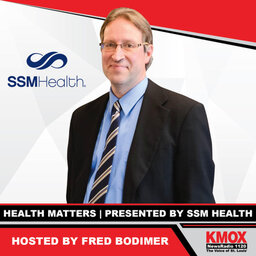August 7th 2021 - Dr. Fred Buckhold, Dr. JoAnn Jose, Dr. Jessica Gold, & Dr. George Daneker
Dr. FRED BUCKHOLD, SLU Care general internist at SSM Health Saint Louis University Hospital. Local COVID numbers look bad, according to Dr. Buckhold. He can't understand why some people continue to say no to the vaccine. Calls it frustrating for doctors and nurses. What do we need to know about breakthrough cases? How long till we get boosters? Should someone who has had the Johnson and Johnson vaccine now go out and get the Pfizer or Moderna vaccine for extra protection? Dr. Buckhold says he would recommend that. How long till the FDA grants full approval for the Pfizer vaccine? Maybe by Labor Day says Dr. Buckhold. How do we get variants and what is Delta Plus?
Dr. JoANN JOSE, SLU Care infectious diseases physician at SSM Health Saint Louis University Hospital. A recent CDC recommendation involving COVID 19 testing for fully vaccinated people is flying under the radar says Dr. Jose. The CDC now says vaccinated people with a known exposure to someone with suspected or confirmed COVID-19 get tested 3-5 days after exposure, and to wear a mask indoors for 14 days or until they receive a negative test result. Should everyone who attended the July 27th St. Louis County Council meeting be tested since a person in attendance was diagnosed with COVID-19? Yes, says Dr. Jose. How do you know when to go get tested? How infectious is the Delta variant? How do you tell difference between casual contact and direct contact? Does it even matter any more? What should you do if you do test positive after being fully vaccinated? How easy is it to get tested today? What types of tests are out there? Which test should you get?
Dr. JESSICA GOLD, Washington University psychiatrist at Barnes Jewish Hospital. This latest surge of infections from the Delta variant is resulting in not just physical strain, but mental strain as well. Dr. Gold says many of us are feeling a range of emotions following this latest Delta surge and new CDC masking recommendations and local mask mandates. They range from sadness to anger to anxiety to frustration and unresolved trauma. Dr. Gold says uncertainty leads to mental stress. Other results include shortness of breath, worries, lack of sleep. What to do? Dr. Gold says acknowledge your feelings, admit them and then look for ways to deal with them. For some, that may mean meditation, yoga, journaling or running. Are there lasting mental health concerns in COVID survivors? What about long haulers? Are you seeing more patients with mental health concerns? How do we talk to loved ones, family, friends and co-workers about COVID-19 when the sides are so drawn?
Dr. GEORGE DANEKER, Vice President and Medical Director for Oncology for the STL Region at SSM Health. A new study from the American Cancer Society and the National Cancer Institute finds cancer death rates are falling - with a few exceptions. Dr. Daneker says this is great news but there are concerns this trend may reverse as soon as the pandemic is over and more serious cancer cases are being diagnosed in people who skipped their regular screening over the past year and a half. Incident rates for men are leveling off, increasing slightly for women and young adults. Increase in cancers due to obesity and lack of physical activity are being seen. Cancer mortality rates are down across the board -- for men, women, young adults and children. Dr. Daneker says cancer is relentless -- so we can no longer avoid getting screening because of our fears of getting COVID when going to the hospital or a medical facility. He says healthcare facilities are very safe and are welcoming patients back. Cancers detected early have a greater chance of being cured, Dr. Daneker says, and there are much better treatment options.
 Health Matters
Health Matters


